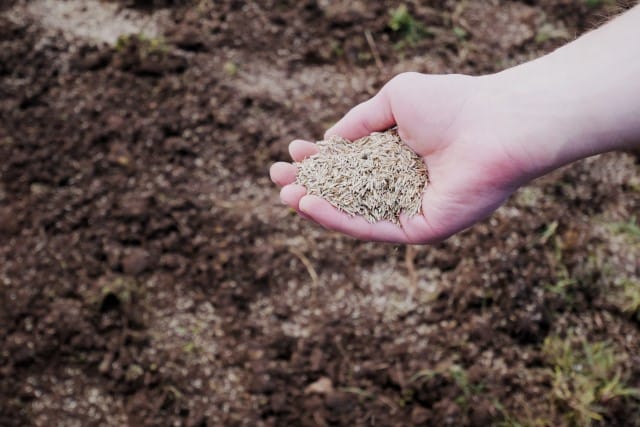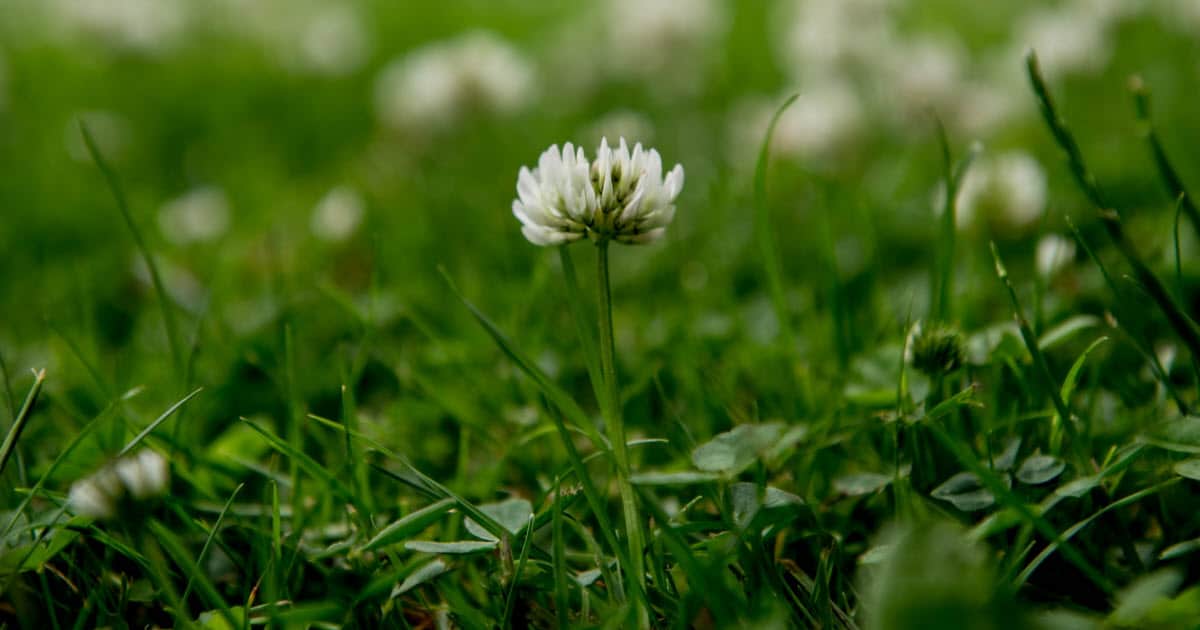Picture this: you work hard to keep your lawn looking green and lush. It’s the perfect length – not too long, but not too short either. It doesn’t look like someone who had an unintentional buzz cut at their barber last week. One day you invite your neighbor over, and after surveying the splendor of your backyard kingdom, Brad from across the street says, “Great lawn you’ve got here… but, uh, shame about all that clover.” But is that really a bad thing, or is clover good for your lawn?
First of all, ouch, Brad, that’s no way to talk to your host. Secondly, what’s so bad about having clover mixed into your turf grass? Until the mid-20th century, clover was widely considered a normal part of a healthy lawn.
After that, people started thinking it was a weed. Slowly but surely, though, this round-leafed little ground cover plant appears to be making a comeback.
Rightfully so, considering that having clover in your lawn can decrease the amount of time and money you spend on maintaining your turf.

This article was last updated on by Lawn Chick Owner Sarah Jameson
Article content reviewed for accuracy by Horticulturist Arthur Davidson, A.S.
Wait a Minute – Clover Isn’t a Weed?
Yes, that’s right. Industrial producers of weed-killers put clover on the ‘naughty list’ in the mid-20th century and many of the best lawn weed killers and even weed and feed products now kill clover.

Clover wasn’t even considered a weed before then. It just got a bad name when pesticide companies developed a formula that happened to kill off clover along with undesirable broadleaf weed varieties.
So this poor little sweet-smelling, luck-bringing plant got lumped in with all the other bad seeds. It has been struggling to clear its name ever since.
If you look back at historical gardening, farming, and botanical guides that describe clover in previous centuries, you’ll read about its widespread uses.
Hailing from Europe, it was brought over to the United States in colonial times. It was put to work as animal feed and as ground cover.
Clover is, in fact, a member of the legume family of plants, so it’s a great addition to livestock grazing fields.
With the rising popularity of trends like finding natural alternatives to mass-produced products, clover is finally getting back into people’s good books.
And with it already settled into most corners of the North American continent, like it or not it’s here to stay unless you’re aggressive in your use of herbicides.
Is Clover Good for Your Lawn?
Clover adds an extra green, tender, and springy layer to the grass in your garden, but it does far more than that to benefit the health of your lawn.

It also offers a host of cost-saving, maintenance-reducing, and environmental benefits.
Interested in learning more about growing a clover lawn? I’ll explore some of these benefits below.
Helps Protect Your Grass from Weeds
Despite clover being labelled as a weed in the 20th century, it actually helps protect your grass from weeds. Thanks to its tight-knit root system, it can force its way down through even hard compacted soil, growing a thick green canopy over spaces where turfgrass may struggle to grow.
This means that clover plants don’t let weeds sneak onto their territory. So you can spend less time and money on eradicating broad-leaf weeds from your yard and make your peace with nitrogen-fixing clover.
Clover is a pesticide-free weed-busting alternative, yet it doesn’t aggressively compete for space with grass, and indeed some of the best clover seeds for lawns contain a combination of grass and clover seed that work well together.
| LawnChick.com is reader supported. If you make a purchase after clicking a link, I may earn a commission at no additional cost to you. |
Clover Doesn’t Need Fertilization (and actually fertilizes nearby grass)
A distinct advantage for lawns with clover is they don’t require as much fertilizer.

In fact, clover creates fertilizer by using nitrogen from the air and absorbing minerals from the soil, adding nitrogen to the soil all by itself.
So it’s a rather kind and generous neighbor (unlike Brad across the street).
Not only will clover make food for the grass around it, but when clover is incorporated into your lawn it will make the entire canopy greener and more resistant to disease.
Minimal Mowing
Unlike grass, which grows continuously, the humble clover plant likes to lay low.

So you’ll hardly need to spend any time cutting it. That is, unless you need to cut the blossoms it produces due to pollen allergies or to keep bees away.
Attracts Pollinators
Speaking of pollinators – many folks might be inclined to view attracting these little critters as a big bonus.
Bees, butterflies, and some small wasp species are responsible for pollinating your garden.
They are also crucial for many agricultural crops of various fruit, vegetables, and nuts. And as you may have heard, global bee populations are sharply declining.
So making your yard a pesticide-free and welcoming haven for our honey-making friends is a noble thing to do.

Whether you choose to plant a full wildflower lawn, or incorporate and accept some clover, your yard can be a great oasis for these important insects.
Even if you don’t care about dying bee populations, human food crops are massively dependent on pollination. Thus, you’d be helping our species by helping theirs.
Cheap and Cheerful
Finally, clover is a cheap-and-cheerful option. It’s prone to staying green throughout the warmer months and even manages to cope quite well in dry areas.
If it isn’t already growing somewhere in your yard, you can buy it very inexpensively online or from your local gardening supply store.
Oh, and it’s also a tough opponent for those discolored urine spots on the lawn that emerge after too many dogs have relieved themselves on a patch.
Does Clover Have Any Disadvantages?
Yes, but not many! Here are the very few disadvantages of clover.
Much Less Hardy
While clover feels invitingly soft underfoot, it’s not as hardy as grass when it comes to coping with a lot of foot traffic. (A mix of clover and grass should be fine, though.)
Clover Stains Clothes More Easily Than Grass
Getting a green clover stain on clothes is tougher to remove than grass stains.
Short Lifespan
For a perennial plant, it doesn’t have the longest life-span. One needs to re-seed clover after two or three years (if you want a lawn consisting of pure clover to avoid patches dying out).
In lawns that contain both clover and grass, the clover usually performs satisfactory re-seeding on its own.
So, How Can I Support Clover Growth On My Lawn?
Whether or not you already have some patches of clover in your garden, the following tips will help you to encourage more of its growth.

Keep in mind that clover loves lots of sunlight and moist ground.
Below, I’ll talk about what to do if you already have some clover growth. After that, you’ll find out what to do if you don’t have any clover but want to grow some.
If You Already Have Some Clover Growth
Here are the rules to follow if there is already some clover in your yard.

- Never spray herbicide on clover.
- Raising the deck height on your mower can nurture existing patches. Avoid mowing lower than 1.5 or 2 inches.
- When summer is in full swing, take a break from mowing lawn patches with clover. This will allow the plant to produce flowers and start its own seeding process.
If You Want to Start Growing Clover
Here’s what you should do if you don’t yet have any clover but want to plant clover in existing lawn areas.
Prepare the Area
Prepare the desired growing location by cutting the grass fairly short and raking the area. Early spring is the best time.
Mix the Seeds
Mix clover seeds with some soil, sand, sawdust, or compost to give them a boost before planting.

The seeds should remain fairly close to the ground surface.
Add Bacterial Inoculant or Starter Fertilizer
If your garden and surroundings are completely clover-free before you plant your own, then it might be a good idea to add some bacterial inoculant or starter fertilizer to the mix.
This will give your seedlings the best chance to grow.
Lightly Water Daily
Lightly water or spray the newly seeded area every day until you see the seedlings emerge.
Make Sure There’s Enough Sun
The ideal location is one with lots of sun.

Clover can grow in areas with light shade, but it will take longer, or you will need to increase the amount of seeds you plant there.
Go Ahead and Let Clover Thrive On Your Lawn
So the next time Brad, your in-laws, or anyone else tries to tell you that clover is a bad thing on your lawn, you can offer them a little lawncare education.
Anyway, it doesn’t really matter what others think. Your lawn is your own, and you can and should create the sort of space you enjoy and are proud to call your own.
As long as you know that you’re creating a healthier and more eco-friendly lawn that you enjoy, you’re good.

And with clover incorporated into your lawn you’ll save time and money otherwise spent on fertilizing and keeping weeds at bay.
And here’s another plus (if you’re the superstitious type). Bringing clover into your lawn only boosts the chances of some four-leafed clover luck coming into your life!











